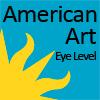Last year, the Smithsonian American Art Museum presented at its Renwick Gallery No Spectators: The Art of Burning Man, an immersive, participatory experience that, for a museum exhibition in a federal building, came as close as it could to emulating the annual event in Nevada's Black Rock Desert. Including a signature temple, the sacred spaces of reflection and prayer that are a hallmark of every Burning Man, was required. We were fortunate to work with the artist David Best, known as the Temple Builder at Burning Man, who created, with his Temple Crew, our , which remains on view until January 5, 2020. It is a sacred space for visitors to leave tributes to loved ones, just like the temples constructed each year on the playa. However, there is one major difference-at Burning Man, the temple and other works of art are burned to the ground at the end of the week in a cathartic act of release, while at the Renwick, the pieces had to be flame retardant in keeping with public building codes. That's why, when curator Nora Atkinson asked me to figure out a way to ship parts of the Temple out to the desert so they could be burned at this year's event, I was more than happy to take on the task.
In the version of the structure at the Renwick, which fills the enormous Grand Salon gallery, visitors are invited to leave a memorial or testament on a wooden tablet and place it somewhere in the room. Since the opening of No Spectators in March 2018, museum colleagues and I have periodically culled tens of thousands of these tablets and put them into storage, in order to make room for more. I try to read as many of them as I can while I gather them up, and have been immensely moved by the expressions of grief, loss, and hope that people have left in the space. For a long time, it was unclear what would happen to the tablets since we couldn't find a place to burn all of them in DC, but I always thought it would be incredible if we could honor these people's stories in the same way that so many others have been honored on the playa.
Working with the local Burning Man community, we eventually came to a two-part solution for the tablets sitting in storage, which totaled around 123,000 and weighed nearly a ton. First, some of them would be incorporated into the Temple at , a public, Burning Man-inspired event held annually by DC Burners on the National Mall. Local artist Michael Verdon and the art collective Infinity Gathered designed the structure, part of which was burned on the Mall in May 2019. The remaining tablets were to be sent to the playa on the DC Burners' shipping container and incorporated into the Chapel of the Chimes, a new art project, also by Infinity Gathered, that was to be burned at Burning Man in September.
In the early morning hours of September 1, the Chapel of the Chimes was set alight in a magnificent blaze. According to Atkinson, who now goes to Burning Man every year, "In my very first conversations with David Best, we knew the tablets needed to be burned, and we dreamed of sending the tablets back to Burning Man. I never imagined how we would do it, but in grand Burning Man fashion, where there's a will, there's a way. I can't express my gratitude enough to the local Burning Man community for helping us to make this happen. The burn was beautiful, and brought the exhibition that began here in DC full circle, back to the playa."
No Spectators: The Art of Burning Man is currently on tour. It makes its next-and final-stop at the Oakland Museum of California, where is will be on view from October 12, 2019 through February 16, 2020.
Elana Hain is a curatorial assistant at SAAM's Renwick Gallery.Related Blog Post: Embrace the Dust: A Burning Man Journal

